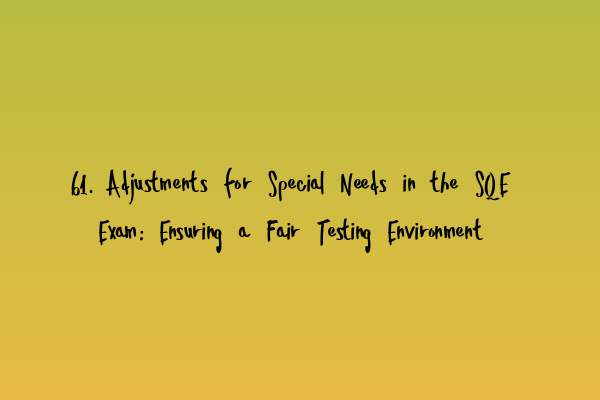61. Adjustments for Special Needs in the SQE Exam: Ensuring a Fair Testing Environment
In the pursuit of fairness and equality, it is crucial for any examination to provide appropriate adjustments for candidates with special needs. The Solicitors Qualifying Exam (SQE) is no exception. The SQE aims to ensure that all candidates, regardless of their circumstances, have an equal opportunity to demonstrate their legal knowledge and skills. In this blog post, we will explore the importance of adjustments for special needs in the SQE exam and how it contributes to creating a fair testing environment.
Understanding Special Needs
Special needs refer to physical, mental, or cognitive conditions that may hinder an individual’s ability to perform tasks or participate in activities to the same extent as others. In the context of the SQE exam, special needs may include but are not limited to:
- Visual impairments
- Hearing impairments
- Physical disabilities
- Dyslexia or other specific learning difficulties
- Anxiety or other mental health conditions
Recognizing and accommodating these diverse needs is essential to ensure that candidates can fully demonstrate their legal knowledge and skills without being disadvantaged. Adjustments for special needs aim to level the playing field, providing candidates with equal opportunities to succeed.
The Importance of Adjustments
Providing adjustments for special needs in the SQE exam aligns with the principles of equal opportunity and inclusivity. Without such adjustments, candidates with special needs may face significant barriers that prevent them from showcasing their true abilities.
In a fair testing environment, all candidates should have equal access to the exam content, instructions, and materials. Adjustments focus on removing unnecessary barriers, ensuring that individuals with special needs can fully engage with the exam process. By creating an inclusive environment, the SQE exam allows candidates to demonstrate their legal competence without interference from their disabilities or conditions.
Moreover, adjustments for special needs promote diversity in the legal profession. By recognizing and accommodating a wide range of disabilities and conditions, the SQE exam actively encourages individuals with special needs to pursue a career in law. It sends a powerful message that the legal profession embraces diversity and values the unique perspectives and contributions of all individuals.
Types of Adjustments
The Solicitors Regulation Authority (SRA), which administers the SQE exam, offers various types of adjustments to accommodate candidates with special needs. These adjustments may include:
- Extra time: Candidates who require additional time due to their disabilities or conditions can be granted extra time to complete the exam.
- Assistive technology: Candidates may be allowed to use assistive technology, such as screen readers or voice recognition software, to aid their engagement with the exam content.
- Alternative formats: The exam materials can be made available in alternative formats, such as large print or braille, for candidates with visual impairments.
- Readers or scribes: Candidates who have difficulty reading or writing may be provided with readers or scribes to assist them during the exam.
- Accessible venues: The exam venues are chosen to ensure accessibility for candidates with physical disabilities.
These adjustments, among others, are designed to meet the specific needs of individuals and provide a level playing field for all candidates. The SRA works closely with candidates and relevant professionals to determine the appropriate adjustments on a case-by-case basis.
Applying for Adjustments
If you have special needs that require adjustments in the SQE exam, it is essential to apply for them in a timely manner. The application process typically involves submitting supporting evidence from qualified professionals, such as medical reports or assessments. The SRA then reviews each application individually to determine the appropriate adjustments to be granted.
It is advisable to reach out to the SRA or consider seeking guidance from SQE preparation courses that have experience in supporting candidates with special needs. They can provide you with valuable insights and assist you in navigating the application process successfully.
Conclusion
Adjustments for special needs in the SQE exam play a vital role in ensuring a fair testing environment. By recognizing and accommodating the diverse needs of candidates, the SQE exam promotes equal opportunity and inclusivity in the legal profession. It offers a level playing field where candidates can showcase their legal competence without being hindered by their disabilities or conditions.
If you are preparing for the SQE exam and have special needs, consider applying for appropriate adjustments to receive equal opportunities to succeed. Remember, the legal profession values diversity, and adjustments for special needs are an essential step towards fostering an inclusive environment.
Related Articles:
